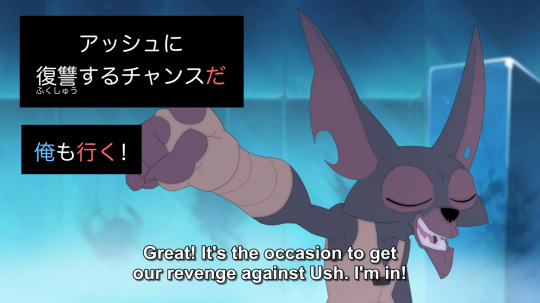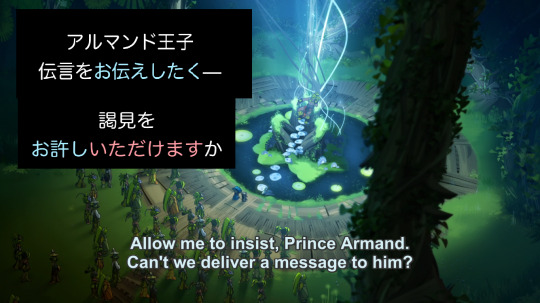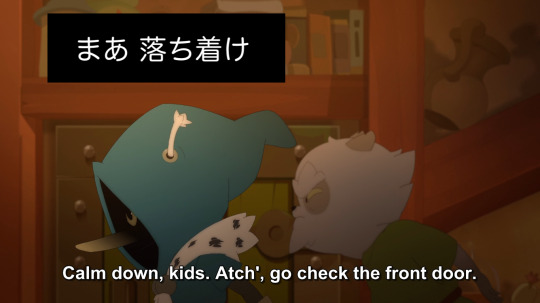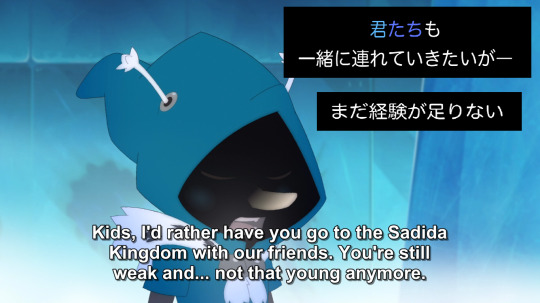#no manga liveblog today just this + another little post + an announcement in an hour. however posting will resume as normal after today
Explore tagged Tumblr posts
Text
A random analysis of the Japanese subs.

This post is so, so self-indulgent, but I hope it'll be fun.
The reason I am making this is simple: I am a linguistics major, I like Dofus and Wakfu, and I really like the way the Japanese language allows one to express themselves by using pronouns and honorifics, both for oneself and others.
It's always fascinating to see what can be said about characters through their usage of Japanese language: both in translations, and in original texts. I'm sure you've heard about the Japanese translation of Undertale, and for a good reason.
...Just like every other post on my blog, this will only be about Kerubim, Atcham, and Joris. But this time, not just because I am so hyperfocused:
Our main sources for Japanese translations of Wakfu are fan subs (hard to find), the lost media dub that has been wiped from the internet (impossible to find), and the official Netflix subs. I do not have Netflix, so I had to employ @dullard's help in this endeavour... except Dullard doesn't know any Japanese, and since Netflix is very anti-piracy, we couldn't screenshare it, which means he had no help from me. It made finding interesting dialogues hard, and the thought of covering more characters is actually scary.
I hope you will enjoy this regardless, and mind the fact that I am not a Japanese speaker — just an enthusiast. (I do study foreign languages for my future profession, but they are English and Chinese, not Japanese...)
A cursory Japanese lesson.
In Japanese, there are many pronouns that mean "I" and "you", instead of just a singular word for each, like in English. It is a little bit similar to the tu/vous system many languages have.
In Japanese, it's quite rude to say "you", and usually, people just use each other's names: "[asking someone named Alice] Does Alice want tea?" is the polite, proper, normal way to ask people things. Saying "you" is usually either something done between people who are close, or people who are way above you on the social ladder.
(For example: "anata" is used/was used by wives towards their husbands, is a generic word when you don't yet know someone's name. It can sound arrogant. "kimi" is used by older male superiors towards employees, older friends towards younger friends, and boyfriends towards girlfriends. It can convey the feeling of closeness with one person taking care of another, or, it can show that someone doesn't respect the other person. "omae" is used to express anger and hate, or to playfully show affection between close friends and family. As you can see, all these words imply a degree of intimacy, when used positively.)
The most common personal pronouns are "watashi" (neutral in polite settings, feminine outside of them), "boku" (soft masculine, light polite), and "ore" (harsh masculine, not polite)
It is normal for pronouns to change with age. All young boys start out using "boku", and usually begin using "ore" or other pronouns later in life. Besides that, many people use different pronouns in different situations: a man might use "ore" with male friends, "boku" with family and women, and "watashi" at work.
However, in a lot of fiction, a character's most used pronoun (and sometimes, the ways they deviate from those pronouns — with whom, and why?) is a part of their character design. Besides pronoun usage, there are also sentence ending particles that exist to show emotion, or speaker's attitude, and their personality. Really, the possibilities are endless. This usage of Japanese is rarely realistic, and is instead something unique to anime, and it's called "yakuwarigo", or "role language".
So, today we will be having a look at the ways the three guys this blog is about were translated in Japanese.
NOTE: Due to anti-piracy functions of Netflix, the screenshots came out completely blank, save for the subs. For this reason, I just added the official Japanese subs to screenshots of the English fan sub + added some colours to a couple of them, in longer sentences, so you can see the boundary of different words.
Atcham

"Ninmu kanryōshita zo" [Mission accomplished]
"ぞ" [zo] is a rough masculine sentence ending particle Strongly asserts one's will, opinion or decision. Very masculine, and at least in media, almost always seen paired together with the usage of "ore" personal pronoun.
Speaking of which...

"Asshu ni fukushū suru chansuda. Ore mo iku!" [It's a chance to get revenge against Ush. I'm going too!]
"俺" [ore] - I, me. Masculine personal pronoun, and like everything masculine, in japanese it's associated with a certain degree of arrogance, antagonization, and rudeness.
PERSONAL NOTE: This pronoun is not something one can use in polite speech, but imagining Atcham resorting to using "boku" or "watashi" gives me psychic damage. If Wakfu was a Japanese series, I assume he'd be a character who is always a bit rude.
We can also observe the usage of the informal "だ" particle, and "行く" [iku], which is a verb that means "to go" in an informal conjugation.
Kerubim

"Washi-ra o hīrō hyouzou no korekushon ni kuwaeyou to" [He wanted to add us to his hero ice sculpture collection, pretty much.]
"わし" [washi] I, me "わしら" [washi-ra] - we, us Here we can see the personal pronoun "washi" with the pluralizing suffix "ら" [ra]. In media, "washi" is used by well-learned, elderly men. If there's a white-bearded centuries-old wizard-king who gives out quests, he probably uses "washi". Gandalf from Lord of the Rings and The Hobbit uses "washi" in the Japanese translation.
PERSONAL NOTE: I think Kerubim, as someone who perpetually dies and is reborn and has to re-age, would probably spend most of his life switching between "ore" as a "young" man, and "washi" as an "old" man. He cares a lot about appearing a certain way, and "a strong man" as well as "a nurturing mentor" are his two favorite images of himself.
"と" [to] is a quote and opinion marker. Japanese language favours vague statements, instead of saying that you're sure of something. There will be a more interesting usage of it later, but here it simply shows that this is being observed. It softens the statement, in a way.

"Washi mo iku, hisabisa no Ekafurippu da. Kono neko ni makase toke!" [I'll go too, it's been a long time since I've been to Ecaflip. Leave it to this kitty!]
There isn't much to say here, besides noting another usage of "washi". The only interesting thing is that Kerubim isn't using official speech, — especially with the informal だ [da] ending particle, which fits him, and the situation itself, well, — as well as the fact that he explicitly calls himself a kitty. (cute)
Joris

"Arumando Ōji, dengon-o otsutae-shitaku, ekken-o oyurushi itadakemasu ka?" [Prince Armand, I would like to deliver a message. Won't you please grant me an audience?]
Three words of this sentence use polite conjugations usually reserved for royalty (shocking, I know...), or someone else much higher than oneself on the social ladder.
"伝える" [tsutaeru] — to report, to convey. This word has had the honorific prefix "お" added to it
"許し" [yurushi] — pardon, forgiveness, permission. This word has had the honorific prefix "お" added to it.
"いただけます" [itadakemasu] — to be able to receive. This is the polite (kenjougo, humble form showing being lower than the person being spoken to) version of multiple other verbs. (don't confuse this with "いただきます" [itadakimasu], which is said before eating food.)

"Desuga! Bonta no masutā kara tsuyoku iwaremashita. Sheran Sharumu-ō e chokusetsu todoke nebanaranai to." [Nevertheless! The Master of Bonta had strongly insisted. It was said to me that the message must be delivered directly to King Sheran-Sharm.]
"ですが" [desuga] - nevertheless, however, alas. It is a polite word, mostly used in official written texts and not in casual conversations, which is befitting this conversation.
"言う" [iu] - to say, to speak, to tell This word is heavily conjugated into the next forms: "言われる" [iwareru] - to be told (impolite) -> "言われました" [iwaremashita] to have been told (polite)
ねばならない [nebanaranai] - must, should, have to This word is mainly used in literature, and is not the typical way to say "must/should/have to" in day-to-day life. It is not just polite, but downright literary/stiff language.
"と" [to] - grammatical quote marker, "it was said..." particle marking a quote that the speaker heard.

"Sagare. Watashi ga aite suru." [Get out of my way. I'll handle him.]
"下がる" [sagaru] - to move away. The word is conjugated with a "-re" ending, which gives it an extremely strong and authoritative tint, as if used by someone in a position of power towards someone below them.
"する" [suru] - to do, to take on, to perform Has no polite ending here. and is very casual/impolite.
In this "heat of the moment" situation, he drops all politeness out the window, and commands Armand to get out for his own safety's sake.
Here we also get Joris's personal pronoun:
"私" [watashi] - I, me (polite, feminine) Because it is used here with someone Joris has used polite language with, like Armand, it doesn't mean much. But when used with people he otherwise drops his politeness with, — or is supposed to drop it, — this pronoun takes on a different tint. It sounds cold, distant, and aloof, — like he is treating even casual conversations like a buisiness exchange. And if it's not aloof, then it might sound a bit feminine.

"Maa, ochitsuke" [Heey, calm down]
"まあ" [maa] - well, I guess, just, now, This is an adverb used in casual speech, used to express things like a mild level of hesitation or uncertainty, or to soften a sentence or a request into a more gentle, relaxed one.
"落ち着く" [ochitsuku] - to calm down The conjugation here is, once again, the commanding imperative. However, it's less of a big deal in this situation, considering:
rough language is good and normal, in casual, friendly speech between men.
it's not him using it with a prince that he was previously showering in highly polite speech, but instead a man he's been living with for 600 years (even if said man is his father).

"Watashi no nou wa mada koutteru rashi" [My brain is still frozen it seems]
This sentence is neither polite nor rude. Mostly notable as a yet another usage of "watashi" in the translation.

"kimi-tachi mo issho ni tsurete ikitaiga, mada keiken ga tarinai" [I'd really like to take you two (affectionate, derigatory, arrogant) with me, but you're lacking in experience]

Here we can see the first translation error: plus tous jeunes being translated as "too young", instead of "not young anymore". But we'll disregard this, and instead focus on something that deranges me:
"君" [kimi] "君たち" [kimi-tachi] - you (plural) "たち" [tachi] is simply a pluralizing suffix, identical to "ら" [ra] in usage.
Yeah Joris "君" [kimi]'d them. He kimi'd them to death. He looked at his dad and called him kimi. He looked at his uncle and called him kimi too.
I know it's likely that the translator just doesn't know better about their relationship, but Joris WOULD do that. he DOES do this by calling them "kids" in french here, so it fits! (I have a huge analysis of this entire scene in my drafts...)
...What is even wrong with him. I love him.
#ro liveblogs dofus#krosmoz#dofus#randominfopost#wakfu#no manga liveblog today just this + another little post + an announcement in an hour. however posting will resume as normal after today#bc itll be running on a queue loll#see you in 2 weeks.#joris jurgen#kerubim crepin#atcham crepin#When I have the time (after my trip)#I'd like to make an index of tu/vous usage by these three and also look at the unofficial japanese sub of the movie.#because im normal about linguistics. obviously.
39 notes
·
View notes